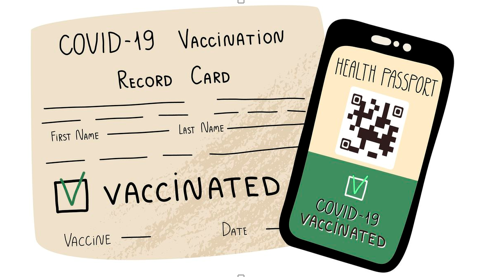Key Takeaways
- “Vaccination passports” pose some worries in terms of privacy considerations
- Businesses and employers however are likely to embrace these practices
- Many countries and regions have in fact started implementing different solutions
I had an interesting conversation with my 11 year old the other day: He stated with all the certainty that one has at that age that “making people get vaccinated in order to go to work is illegal”. He was also worried about the prospect of getting vaccinated this summer, when he turns 12. Apparently there will be a push to have the 12-18 years old's vaccinated this summer. It is certainly interesting times. We don’t often think about the effects or consequences that the past 18 months have had on children. So we had a good chat about what the future holds in terms of vaccinations, how we might be able to eventually return to school in person, go to restaurants, travel etc. Of course, I did some research, and made it this weeks post!
I have no doubt that as the vaccination continues to ramp up, there will be “vaccination passports”, and those who are vaccinated will be afforded more rights and liberties than those who are not. Indeed, as countries make progress on their COVID-19 vaccine rollouts, a debate is heating up over how to revive the international travel sector that was flattened by the global pandemic. That discussion has focused on the idea of a digital passport or vaccine certificate that would allow citizens of one country to prove to border officials in another country that they are fully vaccinated or have tested negative for the virus.
Here is what some regions and countries are contemplating:
- The European Union is in talks with the United States about Europe's Digital Green Certificate scheme, which means Americans might be able to visit the continent as soon as this summer. The EU's planned Digital Green Certificate is a document that can be carried on a smartphone. It would tell officials in other countries that the bearer has been vaccinated, what vaccine was used, whether they have tested negative and whether they have recovered from COVID-19. Each EU country would be responsible for issuing the certificate, which could happen through hospitals, test centers or national health authorities. EU member states would have to accept travelers with valid certificates provided they were vaccinated with a shot approved for use in the EU.
- The United Kingdom said that it is working on a plan to adapt its National Health Service phone app — which is used to access medical records, book appointments and order prescriptions — to work as a digital vaccination and testing verification tool.
- The World Health Organization is working on its own version called a Smart Vaccination Certificate. Israel is looking at adapting its Green Pass — which lets vaccinated Israelis visit restaurants, gyms, concerts and sporting events — to international travel.
- For any Canadians who have travelled in the last 12 months, we are familiar with our “ArriveCan” app. The app also allows travelers to register the results of COVID-19 tests before and after they arrive in Canada, provide details to border agents about their quarantine plans if they cross at a land border, and provide contact information for themselves and the people travelling with them.
- This week, in Quebec, they are issuing a “digital proof”, on the form of those QR codes we have become familiar with, that will allow the barcode to be scanned.
Many are of course concerned about the data protection issues involved in vaccine certification documents, and rightly worry about the individual privacy as this evolves. But I think it’s inevitable, and the rights and safety of the collective are going to trump individual privacy considerations.
So we can’t be sure of the exact format, but no doubt we will being some format of this:

On a business level, to the extent that employees can have the comfort that they are in office buildings with only fellow-immunized colleagues is to my mind a no-brainer. It’s the same for going to a restaurant, or travel, shopping, attending live events etc. Just as after 9-11, the increased safety measures at airports provided a sense of security and comfort, which allowed air travel to resume, so will these “passports.” These are business decisions, all designed to encourage its customers to feel safe and congregate. Personally, I’d gladly share “data”, to be able to travel, or go to a sporting event, or eat in a restaurant: safe in the knowledge that those around me are following the same protocols.
As investors, this is an opportunity to revisit the types of companies we are investing in. Some of the so-called “stay-at-home” stocks, might not fare as well. Other sectors that have embraced the on-line model in the absence of consumers in person could also benefit. Now, inflation is all people want to talk about. It’s difficult to have a conversation without someone bringing up the cost of lumber. But that’s for another post. As we emerge from this, I do believe we need to be opportunistic and mindful of what might be the same, and different going forward.
While I’m not sure of what to make of this so-called “one-dose summer” and what it looks like, I’m sure that given the extension of the lock-down for those of us in Ontario for two more weeks, it will provide much dinner time fodder, as we try and figure out what a “slightly better summer" means. We wait!
